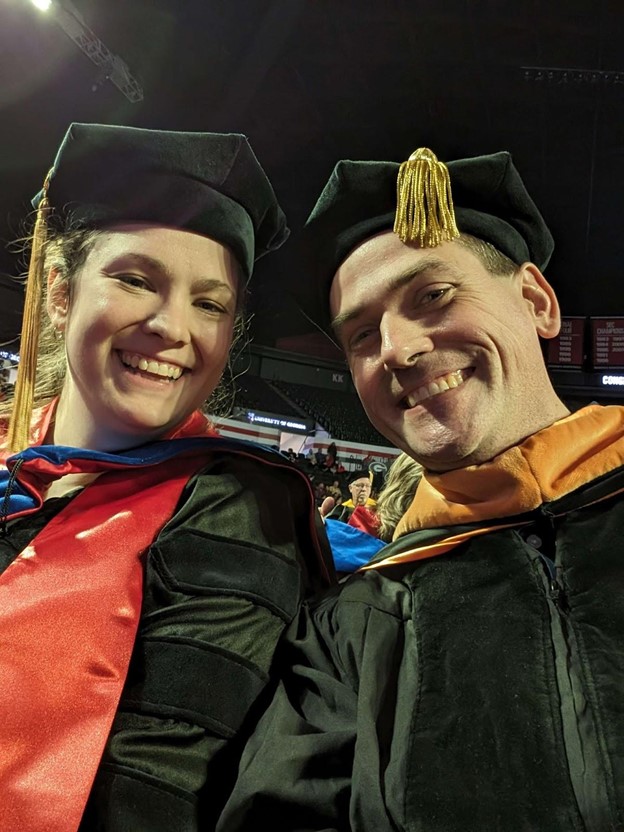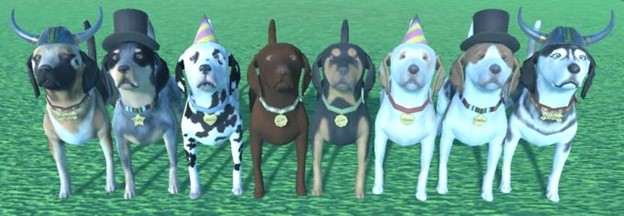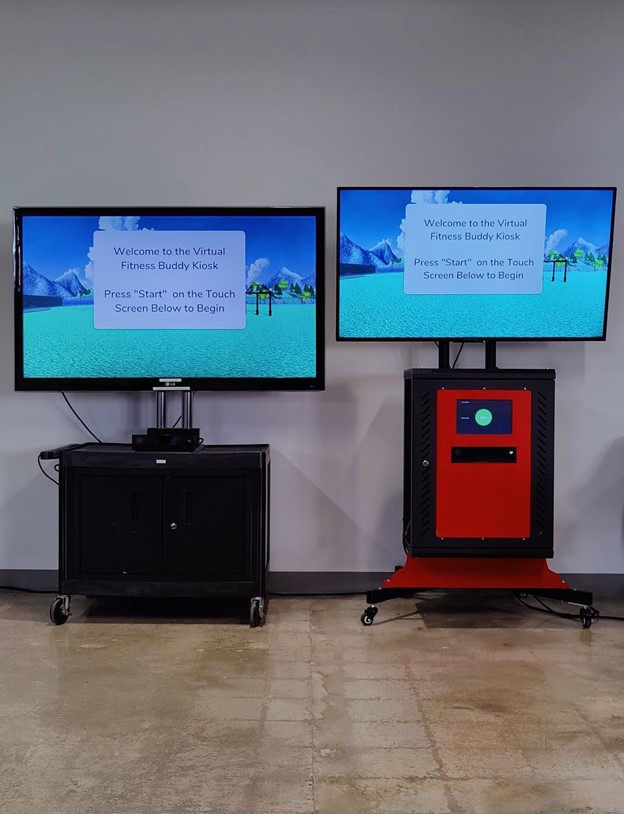
Dr. Catherine Ball is one of most recent graduates from the School of Electrical and Computer Engineering. She completed her PhD with Dr. Kyle Johnsen in the Virtual Experiences Lab this past December 2023. We reached out to Dr. Ball to learn more about her journey as an electrical and computer engineer!

Winter Graduation ’23. Dr. Catherine Ball and Dr. Kyle Johnsen
I consider Maysville, GA, to be my hometown as it’s the childhood home I remember most. I was originally born and lived in Laurens, SC, until I was around 10.
I earned a B.S. in Psychology at UGA. I did start a second B.S. in Computer Systems Engineering at UGA, but I changed from that to an M.S. in Engineering and eventually to a PhD in Engineering. My PhD research largely revolved around building and evaluating buddy-based virtual experiences. These experiences were built using Unity3D and utilized either a large screen kiosk along with a Microsoft Kinect or an iPad.
Tell us more about your research work:
I built and researched buddy-based virtual experiences, specifically analyzing data such as which minigames were played the most, when and how often participants engaged with their virtual buddies, and how these trends changed over time. These experiences were primarily used by children during summer camps, afterschool programs, at a children’s museum, or at home. Each child could customize their virtual buddy and interact with them throughout the course of their respective studies, unlocking new games or customizations for their buddy as they achieved their goals. While my analysis focused more on game metrics and how children engaged with their virtual buddies, these studies all had larger study goals, such as encouraging children to engage in healthy physical activity habits or aiding them while they learned various science, technology, engineering, and math concepts.
Evaluating what and how our participants engaged with various components of the virtual experience allowed us to decide which components appeared to be beneficial and to continue developing them for future studies or which were a detriment and remove them. Given that each of our studies built upon what we learned from our previous virtual buddy-based studies, another goal of my dissertation was to document our lessons learned throughout the years of field studies we had conducted. This included the rationale behind our design decisions. While the rationale and conclusions were specific to our studies and their specific needs, explaining why we made these decisions and what components of our study influenced them could inform future research in a more generalized way rather than simply conveying what we did.

Examples of buddies from the Virtual Fitness Buddy Project.
Why did you choose UGA?
Prior to my undergrad, I was able to dual-enroll at UGA during my final semester in high school. I really enjoyed the “vibe” of campus and continued on at UGA for my undergrad. For my graduate degree, I considered other programs for a Masters’ before I knew there was a Computer Systems Engineering undergrad at UGA. The program fit what I was interested in pursuing that would also allow me to apply what I had learned for my Psychology B.S. I instantly loved the ethos and how the engineering department was managed. Not too long after I started my second undergrad, I met Dr. Kyle Johnsen, my major professor (and “the VR guy” on campus) and the rest was history. I will always appreciate the care and dedication of the College of Engineering faculty, staff, and students, including the chance to witness up close how my major professor approached styling his classes and the care he put into their design and implementation. For these reasons along with the College’s ethos of engineering for a purpose, I chose to stay at UGA.
When did you become interested in engineering?
I have always had a fondness for video games for as long as I can remember. My mother was self-employed since I was born, and I spent time in her office frequently. While there, she introduced me to computer games (Oregon Trail is the first one I remember) and the internet at a very young age as a way to keep me occupied. My older brother also owned a Sega Genesis and Super Nintendo, which are also among some of my earliest memories. It is because of this fondness that I grew to appreciate that video games could be used for more than entertainment and is the reason I pursued engineering: I wanted to be able to build virtual experiences that help people beyond the relaxation of entertainment. Building these virtual experiences was the perfect application for me to use my psychology knowledge in the way I wanted to apply it. I started coding and never looked back.
What are your plans after graduating?
I am still working out exactly what I want to do now that I have finished my degree. I know that it will involve building these virtual experiences in some capacity. This could involve working with a game studio or outside of the video game industry developing educational applications. I want to be a part of a team that brings these experiences to life, where I can put my engineering chops and design knowledge to use and expand my repertoire along the way.
What is one crucial skill you believe every engineering student needs to succeed and why?
Every engineer needs to be able to communicate their ideas not only to their peers but also to non-experts. I think it is very easy to forget that not everyone understands the significance of certain terms or concepts that are second nature to us. By translating our technical jargon into words that non-experts can follow, we are able to convey the importance of our decisions to an interdisciplinary team and better equip them to discuss and contribute to our ideas. Additionally, I think it also reinforces our understanding of the concepts and rationale behind those decisions.
What do you find most enjoyable about engineering?
I love to solve problems and that is what engineers do. I really enjoy solving puzzles within a set of boundaries and rules, such as the requirements for implementing virtual experiences in the field where not only does the target audience but also the environment need to be considered. Translating these requirements into actionable designs is one of my favorite things to do.
Tell about one of your most favorite engineering projects.
Honestly, I have two favorites, including the project I worked on as part of my dissertation: Virtual Fitness Buddy (VFB). The other is a VR jet pack experience that I worked on as a final project for Dr. Johnsen’s VR class. This was before commercial headsets were widely available. So, we used ski goggles with a 3D printed holder for an iPod Touch as our headset along with a pair of controllers (Razer Hydra) that would provide us 3D motion control with a relative distance to the headset, where we mounted one of the controllers. I spent a long time tweaking the physics for the jetpack to get the “feel” right. It is this project where it ultimately clicked for me that I really enjoyed this stuff and what a powerful medium VR could be.

The two kiosks we used across our Virtual Fitness Buddy studies. These kiosks consisted of a large screen TV, Microsoft Kinect, and a locking cabinet. The later iteration (right) also includes a touchscreen.



